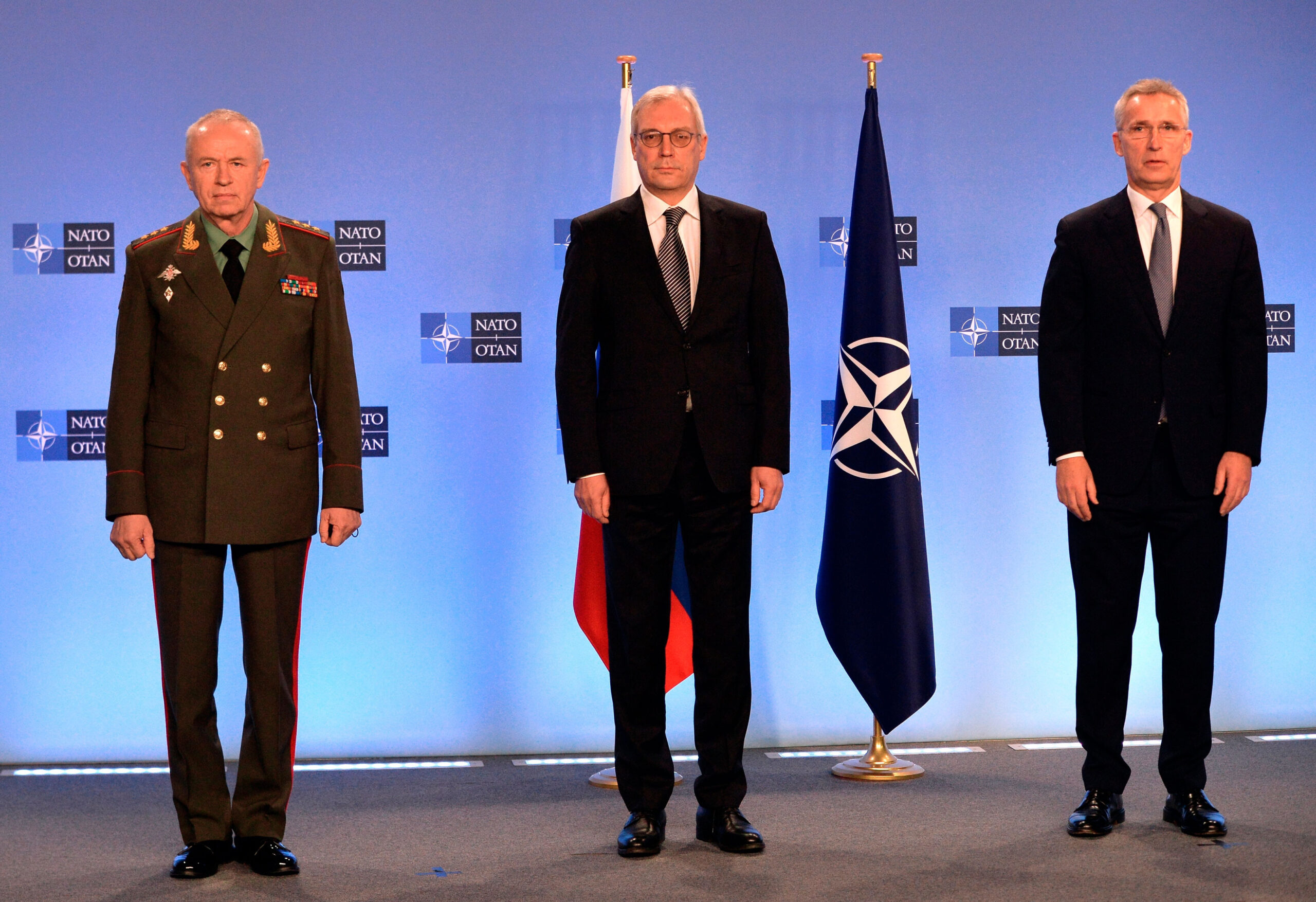
6739262 12.01.2022 Russian Deputy Defence Minister Alexander Fomin, Russian Deputy Foreign Minister Alexander Grushko and NATO Secretary General Jens Stoltenberg attend a photographing ceremony before the Russia - NATO talks in Brussels, Belgium. Alexey Vitvitsky / Sputnik via AP
Russia has not committed to de-escalate on the Ukrainian border after two rounds of diplomatic talks this week, Deputy US Secretary of State Wendy Sherman said Wednesday.
Sherman told reporters that Wednesday’s meeting between NATO and Russia ended with a “sober challenge from the NATO allies to Russia” to respond to the opportunities offered by the international community to de-escalate the situation on the border with Ukraine and choose the path of diplomacy.
She said it wasn’t clear yet what Russia’s aims were, pointing to reports that Russia was conducting live fire exercises along the border.
“When live fire exercises are reported this morning. What is this about?” Sherman said. “Is this about invasion? Is this about intimidation? Is this about trying to be subversive? I don’t know. But it is not conducive to getting diplomatic solutions.”
Asked by CNN’s Alex Marquardt if the Russians had made any commitments to de-escalate, Sherman said they did not.
“There was no commitment to de-escalation, no,” she said, before pausing and adding: “Nor was there a statement that there would not be.”
Wednesday’s session with the NATO-Russia Council was the second of three planned for this week. The US delegation led by Sherman met with the Russians on Monday, and the Organization for Security and Co-operation in Europe will hold a session with Russia on Thursday.
NATO Secretary General Jens Stoltenberg said Wednesday that the meeting between NATO and Russia over the situation in Ukraine was “not an easy discussion” and that “differences will not be easy to bridge,” but added that NATO allies and Russia “expressed the need to resume dialogue.”
“This was not an easy discussion but that is exactly why this meeting was so important,” he told reporters in Brussels.
“We had a very serious and direct exchange on the situation in and around Ukraine and the implications for European security. There are significant differences between NATO allies and Russia on these issues. Our differences will not be easy to bridge but it is a positive sign that all NATO allies and Russia sat down around the same table and engaged on substantial topics.”
Representatives from Russia and NATO met in Brussels on Wednesday for high-stakes talks aimed at defusing growing tensions over Russia’s military buildup near the Ukraine border.
The talks ran about four hours long — roughly an hour longer than expected, a source with knowledge of the talks told CNN.
Moscow has dismissed such claims. However, Russia has been amassing as many as 100,000 troops near the Ukrainian frontier, and on the eve of the talks, the military began live-fire drills in regions close to the border.
The United States, NATO and their allies are pushing Russia to de-escalate the situation. Moscow has demanded security guarantees from the US and NATO, including a binding pledge that NATO won’t expand further east and will not allow Ukraine to join the military alliance — something NATO is not willing to do.
“At this point, let me be very, very clear — no one is suggesting that we alter NATO policy on enlargement,” US Ambassador to NATO Julianne Smith told CNN on Tuesday.
Rather than being framed as a bilateral NATO-Russia meeting, Wednesday’s gathering saw each of NATO’s 30 member states and Russia represented equally, in a forum of 31. The meeting is the second of three key engagements between the West and Russia this week.
Ukraine said Tuesday that it was confident that the US and other NATO countries would not make a decision “on the fate” of the country “behind our backs” during the meetings.
Source: CNN








